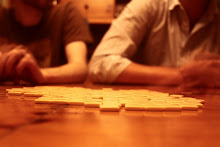An old man and his son lived in an abandoned fortress on the side of a hill. Their only possession of value was a horse. One day, the horse ran away. The neighbors came by to offer sympathy. "That's really bad!" they said. "How do you know?" asked the old man. The next day, the horse returned, bringing with it several wild horses. The old man and his son shut them all inside the gate. The neighbors hurried over. "That's really good!" they said. "How do you know?" asked the old man. The following day, the son tried riding one of the wild horses, fell off, and broke his leg. The neighbors came around as soon as they heard the news. "That's really bad!" they said. "How do you know?" asked the old man. The day after that, the army came through, forcing the local young men into service to fight a faraway battle against the northern barbarians. Many of them would never return. But the son couldn't go, because he'd broken his leg.
This story is brilliant in both its insight and simplicity, isn't it? How many of us react immediately to events with pessimism and anxiety? I am the kind of person who hears good news and immediately attempts to imagine every possible way that it could all go badly and burst into flames. Yet the simple fact of the matter is that we do not know the future. Only God does. So when events unfold for us, we do not know how they will ultimately conclude or what implications they will have for our lives. But as Christians we believe that Yahweh is altogether good, just, and fair. So we have the confidence that, as Paul states in Romans 8, "God works all things for good for those who love him." This certainly has become a bit of a cliche in the Christian subculture and can be applied in a hackneyed way, but it is nevertheless true--as we see in the life of Joseph (Genesis 37-50). This doesn't mean that God makes sure everything will be easy for us or that we will get whatever we want--many times this is not the case, as the story of Joseph shows us so clearly. But it does mean that God's good purposes will prevail in our lives, regardless of the seeming obstacles that lie in the way.
A part of the Good Life is relinquishing our anxiety. When bad things happen to us, we must remember that we do not know how things will ultimately turn out, but we do know that God is good and is in complete control of the final outcome. Those things that at first seem like devastating setbacks may in fact be the necessary steps we take to real success.
*Benjamin Hoff. The Te of Piglet (New York: Penguin Books, 1993), 171-72. Hoff states that his version of the story is adapted from the original by Liu An (Huai-nan-tse).
**Hoff's prequel to The Te of Piglet, is, in my opinion, even more phenomenal. Hoff, Benjamin. The Tao of Pooh. New York: Dutton, 1982.




No comments:
Post a Comment
What do you think?